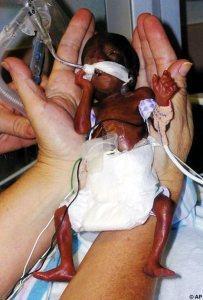 Diane Abbott has hit out at the equality minister Maria Miller who called for the abortion limit to be cut to 20 weeks. Abbott called the move “anti women” but the debate is more complex than that. And believing there is a case for reducing the limit does not necessarily make someone “right wing.”
Diane Abbott has hit out at the equality minister Maria Miller who called for the abortion limit to be cut to 20 weeks. Abbott called the move “anti women” but the debate is more complex than that. And believing there is a case for reducing the limit does not necessarily make someone “right wing.”
Abbott is quoted in the Huffington Post today as saying:
“I think it’s very alarming that a minister for women should express these views. I appreciate she’s doing it in a personal capacity but the way that right-wing elements of that have latched on to that, talking about starting a campaign to lower time limits [for abortion] is not helpful.
“Tories need to move away from this anti-women politics and I hope that the Department of Health means what it says when it says it has no plans to lower the time limit.
“If right-wing Tories are unwise enough to launch a campaign on time limits in the Autumn I will be standing ready to work with other MPs across the house to oppose them.”
Abbott had been responding to Miller’s comments that it was “common sense” to reduce the time limit from 24 to 20 weeks.
It would be tragic if this most sensitive of issues descends into the kind of Right versus Left slanging match seen so often in the United States. Surely it is more about the moral compass than the political spectrum?

Amillia Taylor, survived at 22 weeks and six days
I am liberal on many issues – hardly a surprise as a Liberal Democrat – but on abortion the key question is whether we have struck the right balance between choice for those who really need it and discouragement of those for whom it is a lifestyle choice.
Some women might take me to task for using a term like ‘lifestyle choice’, arguing that no woman would take such a life and death decision lightly. I’m afraid some women do abort for career considerations or an unwillingness to use contraception. If a lack of contraception is the fault of a pushy man, or a woman who fails to insist on using protection, is this justification for terminating the pregnancy?
Whatever my own views on this question, I am still pro-choice in that I’m against the removal of abortion as a choice. In some cases, such as rape or severe disability, the decision of the woman to abort has weight. And for most women it is not an easy choice; far from it, the decision can be difficult and traumatic.
But there are two key factors here; where society draws the line as far as the cut-off date is concerned, and whether lowering the limit can help prevent unnecessary terminations.
The current 24 week limit is almost six months, and there is evidence that by this period the foetus is already significantly developed. Lowering it to, say, 20 weeks still means the woman can terminate up to almost five months into her labour. For many that is an adequate time to decide whether or not to abort.
Does reducing of the limit by four weeks mean that, where there is a strong argument for termination, woman are unable to go for the procedure? I would suggest that it does not, and that 20 weeks is more than enough time to decide.
There were over 189,000 legal abortions in the UK in 2010. Were each and every one of these terminations absolutely necessary and justified? I suspect not.
Every day that passes means the foetus is ever-more developed. If a termination is inevitable then it is in everyone’s interests, including the woman, to get it done as soon as possible.
So if reducing the time limit from 24 to 20 weeks helps reduce the number of unnecessary terminations then if there was a compelling argument that it would not adversely hit ‘justified’ abortions I would probably vote for a reduction.
There is also evidence that even by 20 weeks the foetus shows enough human features and characteristics to be considered human. Occasionally babies can survive at 22 weeks although this is rare. Amillia Taylor, from Florida, survived after being born at 22 weeks and six days.
But even though most babies only survive after 28 weeks we still ought to consider that even foetuses too under-developed to survive still display signs of being human that should give us all pause for thought.
At nine weeks a foetus can squint, swallow, move their tongue, and would make a fist if you were to stroke their palm. At ten weeks its’ brain has the same structure it will have at birth and within the next week all body systems will begin functioning. At twelve weeks a heartbeat can be detected and by week sixteen it has eyelashes and reacts to touch and noise.
Clearly unable to function independently of the womb but nevertheless taking on many human characteristics.
We need to also consider evidence that even aborted foetuses too young to survive have displayed signs of distress and pain during termination. This is disputed by some experts who say that the nerve systems to transmit pain are not in place until 26 weeks, but the US state of Nebraska used scientific studies, showing that pain is felt at 20 weeks, to reduce the time limit.
This US study, published by the British Medical Journal, argues that while the nervous system before 26 weeks is “yet to fully mature” it has been developing since seven weeks and that “pain is observable in fetuses at 18 weeks’ gestation.”
As someone who is firmly on the progressive Left on most issues, abortion is probably one area where I differ. At my core, I have an intrinsic belief in the sanctity of life and that no-one has the right to take that away. This is more spiritual than Christian and I am certainly no Bible-thumping evangelist.
I believe that life starts at conception and in that sense any termination is a tragedy for the unborn, but I also recognise that some terminations are inevitable for different reasons and that the choice must therefore be available to those women who really need it.
But the reality of life is that we all know, or have heard, of women who abort for no other reason than they, and their partners, have been careless and are able to care for a baby but choose not to do so because it doesn’t fit in with their plans. Stories about teenagers who have had multiple abortions are increasingly common and while we do not want to return to the puritanical pre-1940s there is all too often a general disregard for the life of the unborn.
There is also a racial element to this. In 2009 Dr Alveda King, the niece of Dr Martin Luther King, has claimed abortions were “wiping out one-quarter of the African-American population”, as figures revealed that 37 percent of all terminations were black compared to an African-American population of 14%.
In Britain figures from the Department of Health show that 48 percent of Black women have had an abortion compared to 33 percent of White women. And in 2010, 14 percent of all abortions were carried out on Black women, up from 11 percent in 2008. This contrasts with a Black British population of 4.6 percent, according to the 2011 Census.
While African-Americans were over two and a half times more likely to have an abortion than their white counterparts, Black British women were over three times as likely to have a termination.
On one level this is a surprising state of affairs given the prevalence of religion, which takes such a strong anti-abortion stance, in the lives of so many in the Black community. Even if you take religion out of the equation, abortion tends to be frowned upon at the best of times in African and Caribbean homes.
The fact that over 20,000 Black foetuses are terminated every year in the UK without provoking hardly a ripple of social debate, let alone the kind of political storms that accompany the issue in the United States, is all the more astonishing.
Social deprivation is partly responsible, as the report A Matter of Choice by the Joseph Rowntree Foundation noted.
While some of these 20,000 Black abortions will be justified, I suspect many are a reflection of other factors. A music and media culture that elevates sex, the absence of opportunities that makes sexual activity one of the few pastimes available to the young, and a youth culture that increasingly disrespects women.
Where the only ‘rite of passage’ is sex and the image of the Black woman as a Queen does not even begin to figure.
I understand why some do not wish to venture into this subject, for fear of prompting stereotypes about the sexuality of Black men and implies that Black women are promiscuous. Yes, we need a debate free of these stereotypes but that should not prevent us from considering the disproportionality in the abortion figures.
The statistics should also give food for thought to social commentators and religious leaders alike. I believe the disproportionality in the figures reflects the distressed condition of many in the Black community after generations of discrimination and lack of opportunities, and centuries of racism and oppression.
Conversely conversations about healing must include the rate of abortions as well as the more talked-about issues of disproportionate unemployment, stop and search, incarceration, school exclusions and so on.
I take issue with Diane Abbott’s remarks that portray abortion as being about Left versus Right, the rights of women versus those who are unsympathetic to those rights.
It is about much more than that. It is also a moral, cultural, racial and historical debate. And one that is not merely framed by Western feminist principles but is also informed by the spiritual. Not dogmatic religiosity but a spirituality drawn from our roots that takes us from ‘should we allow abortions?’, and ‘why are we aborting?’ to ask how this issue fits into the wider picture of where we are as a society and as a community.
By Lester Holloway @brolezholloway
